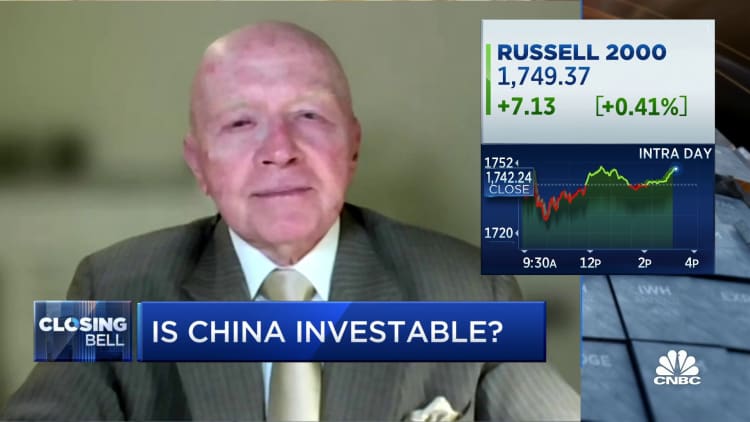Shares of Chinese companies listed in the U.S. dropped sharply Monday after Beijing tightened President Xi Jinping's grip on power, souring investor sentiment for non-state-driven companies.
The Invesco Golden Dragon China ETF, which tracks the Nasdaq Goldman Dragon China Index, plunged 14.5% to hit its lowest level since 2009. The ETF slumped more than 20% at one point Monday. The index holds 65 companies whose common stocks are publicly traded in the U.S. and the majority of whose business is conducted within the People's Republic of China.
Tech giant Alibaba was down more than 12% after earlier dropping over 19% to a new 52-week low. Tencent Music Entertainment fell 5%, paring an earlier decline of 18%. Another tech name Pinduoduo ended the day 24.6% lower after earlier falling a whopping 34% on Monday.
The moves come after Xi paved the way for an unprecedented third term as leader and packed the Politburo standing committee, the core circle of power in the ruling Communist Party of China, with loyalists.

Under Xi's leadership, China has implemented a raft of policy that has tightened regulation on the tech sector in areas from data protection to governing the way in which algorithms can be used.
Meanwhile, Xi has stuck to the strict "zero-Covid" policy which has seen cities, including the mega financial hub of Shanghai, locked down this year, even as most of the world has opened their economies.
"Stocks based in the world's second largest economy are 'uninvestable' again," Bernstein sales trading desk's Mark Schilsky said in a note Monday.
Hong Kong's Hang Seng index spiraled down 6.36% to its lowest levels since April 2009. The Shanghai Composite and the Shenzhen Component in mainland China both lost about 2%.
Wall Street's top strategist, Marko Kolanovic of JPMorgan believes the sell-off in Chinese stocks is disconnected from fundamentals, presenting a buying opportunity.
— CNBC's Arjun Kharpal contributed reporting.


